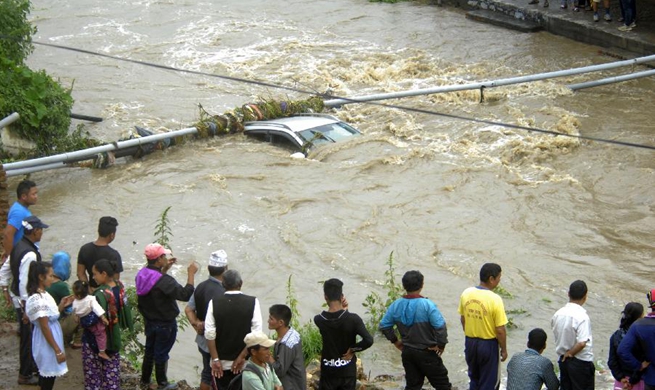WASHINGTON, Aug. 6 (Xinhua) -- Chinese and American researchers found that increasing precipitation, a symptom of climate change, made it harder for forest soils to trap greenhouse gases, creating a feedback loop that exacerbated global warming.
A study published on Monday in the journal Proceedings of the National Academy of Sciences showed that forest soils had been overestimated as methane sinks by over 50 percent worldwide.
The uptake reductions were most pronounced in places where the soil had experienced increasing moisture levels over time, according to the study.
They occurred despite marked declines in nitrogen deposition and increases in atmospheric methane concentrations and temperature, which should lead to increased forest-soil uptake of methane.
The paper's lead author Ni Xiangyin with Sichuan Agricultural University said, "Long-term changes in precipitation and forest soil methane uptake should be factored into models being used to inform policy decisions around methane-producing activities."
They first measured in situ methane uptake in four urban and four rural forest sites of similar age and composition in Baltimore, Maryland, between November 1998 and December 2016.
They found methane uptake had decreased by 62 percent at the urban sites and 53 percent at the rural ones even as methane concentrations in the atmosphere increased during that same period.
Scientists also measured methane uptake levels in four calcium-fertilized and four reference forest sites in New Hampshire.
Those measurements, which were made only during summer months from 2002 to 2015, showed methane uptake had decreased by 74 percent at calcium-fertilized locations and 89 percent at reference sites.
Then, they retrieved data from 317 previously published, peer-reviewed articles on forest-soil methane uptake around the world, reporting an average decrease of 77 percent.
"Our data strongly suggests that we're significantly overestimating how much methane is being captured by forest soil, and that means a lot more of this greenhouse gas is ending up in our atmosphere a lot faster than we believe," said the paper's corresponding author Peter Groffman, a senior research fellow at the Cary Institute of Ecosystem Studies.
"This study shows large, long-term declines in the ability of soil to absorb methane," said Doug Levey, a director of the United States National Science Foundation's Long-Term Ecological Research program, which funded the research.
"That can explain why the amount of methane, a potent greenhouse gas, has been increasing in the atmosphere. The results uncover an important link among the soil, the atmosphere, and climate," said Levey.

















